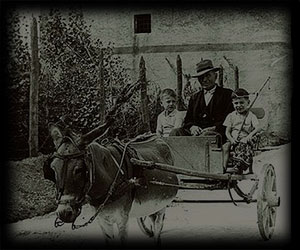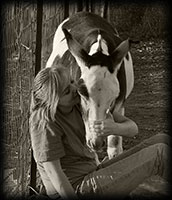Donkey InformationSome History on Miniature Donkeys
In May of 1929, Robert Green imported six miniature jennies and a jack into the United States from the Mediterranean islands of Sicily and Sardinia. Tragically, three of these donkeys were killed by domestic dogs shortly after arriving at their farm in New York. The remaining original donkeys were supplemented with additional importations until the 1950’s or early 1960’s. They are now almost extinct in their native land where they'd served as 'beasts of burden'. They had been used to carry water from village wells and supplies into the mountains for shepherds. Because of their small size, they had also been used to turn grinding stones for grain inside the peasants’ homes! These hard-working little creatures were often underfed and over worked. One of Mr. Green’s first customers was August Busch Jr, of Busch Beer, who became one of the largest original breeders of miniature donkeys in the United States. Early in the 1950’s Daniel & Bea Langfeld purchased their first miniature donkey from Mr. Busch as a pet for their daughter who had cerebral palsy. The Langfelds later became the first professional breeders of miniature donkeys and founded Danby Farms. Mrs. Langfeld established a registry for miniature donkeys in 1958 and later turned the stewardship of the registry over to the American Donkey and Mule Society in 1987. With proper lifelong care, miniature donkeys will live between 25-40 years. The longest documented donkey lived to 47! When mature, they weigh 200-350 pounds, and reach 36” in height. At the end of an average gestation of 12 months, a jennet gives birth to a foal weighing 18-25 pounds and standing 18-26 inches tall. From the moment the tiny, fluffy, long-eared foal is born, its mission is to give love and to thrive on affection. Miniature donkeys are born in a delightful array of colors from the classic gray to black, sorrel, brown, spotted, roan, and even ivory (blue eyed with pink skin). Nearly all miniature donkeys have a stripe running down their backs with a cross over their shoulders, some have “garters” or stripes ringing the legs. Every donkey has its own style of braying with some being quite comical. Their voices range from barely being audible to a loud thunderous 'hee haw'. Unlike the horse, the donkey does not possess a strong flight instinct. When threatened or scared, these cautious self preserving creatures look over a situation and determine the best approach. This instinct to stop and assess a situation has earned the donkey the unjustifiable reputation of being stubborn. 
The miniature donkey has many uses. Their gentle personalities and loving nature makes them the perfect companion for children, people with disabilities and the elderly. They never tire of being brushed, loved, hugged, and kissed and will seek you out for attention. They will provide a lifetime of laughter with their comical antics to get your attention and their inquisitive nature. With their small size and calming influence, they make excellent companions for a lonely animal or one being transported or confined due to injury or surgery. They can be conditioned to carry a pack weighing up to 100 lbs for backpackers, hunters, and hikers; and nothing can beat their sure footedness on the trail. These docile creatures are extremely intelligent. That combined with their willingness to please makes them easy to train to pull a cart or carry a small child. These same traits also make the miniature donkey a perfect candidate for learning and remembering tricks. With the popularity of these little creatures growing, shows are being offered around the country and at many state fairs with classes in halter, color, driving, jumping, and obstacle.
|